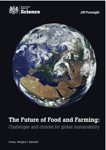 Two weeks ago I wrote on Hand picked about a Worldwatch Institute report on how agricultural innovations could help to feed our growing population. This week saw the launch of another major report on global food security. The report by Foresight, the UK Government's futures think tank, argues for fundamental change to the global food system if a rapidly expanding global population is to be fed over the next 40 years.
Two weeks ago I wrote on Hand picked about a Worldwatch Institute report on how agricultural innovations could help to feed our growing population. This week saw the launch of another major report on global food security. The report by Foresight, the UK Government's futures think tank, argues for fundamental change to the global food system if a rapidly expanding global population is to be fed over the next 40 years.
The Foresight project 'Global Food and Farming Futures' has examined how a rapidly expanding global population can be fed in a healthy and sustainable way. With threats to the food system including changes in the climate, competition for resources such as water supply and energy, and changing consumption patterns, the report highlights the considerable challenges to sustaining the world's food supply.
The reports' message is stark, as it says piecemeal changes are not enough. "Nothing less is required than a redesign of the whole food system to bring sustainability to the fore" it warns.
Professor Sir John Beddington, the UK Government's Chief Scientific Adviser and Head of the Foresight programme, said:
"The Foresight study shows that the food system is already failing in at least two ways. Firstly, it is unsustainable, with resources being used faster than they can be naturally replenished. Secondly, a billion people are going hungry with another billion people suffering from 'hidden hunger', whilst a billion people are over-consuming.
The report's main findings are:
- Threat of hunger could increase: Efforts to end hunger internationally are already stalling, and without decisive action food prices could rise substantially over the next 40 years making the situation worse. This will affect us all – as more of the world suffers from hunger social tensions will increase, as will the threat of conflict and migration. Wider economic growth will also be affected.
- The global food system is living outside its means, consuming resources faster than are naturally replenished. It must be redesigned to bring sustainability centre stage: Substantial changes will be required throughout the food system and related areas, such as water use, energy use and addressing climate change, if food security is to be provided for a predicted nine billion or more people out to 2050.
- There is no quick fix: The potential threats converging on the global food system are so great that action is needed across many fronts, from changing diets to eliminating food waste.
The report highlights areas for change including:
- Minimising waste in all areas of the food system: An amount of food equivalent to about a quarter of today's annual production could potentially be saved by 2050 if the current estimate of global food waste is halved.
- Balancing future demand and supply in the food system: This could include helping businesses to measure the environmental impacts of food so that consumers can choose products that promote sustainability.
- Improving governance of the global food system: The project's economic modelling suggests that trade restrictions can amplify shocks in the food system, raising prices further.
The challenges identified in the report show an urgent need to link food and agriculture policy to wider global governance agendas such as climate change mitigation, biodiversity and international development. It says that no technology, including genetic modification, should be ruled out, although it acknowledges that there is public resistance to some of these technologies. And on a positive note, by assessing 40 success stories from Africa the report authors say the spread of existing best-practice could treble food production.
The report outlines the findings of an extensive two-year study involving around 400 experts from about 35 countries. The report, and associated documents including Synthesis Reports on key challenges, a wide range of scientific reviews, and workshop reports, can all be accessed at the Foresight website.
